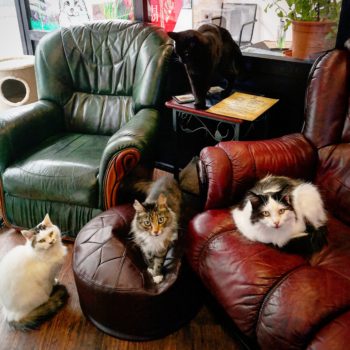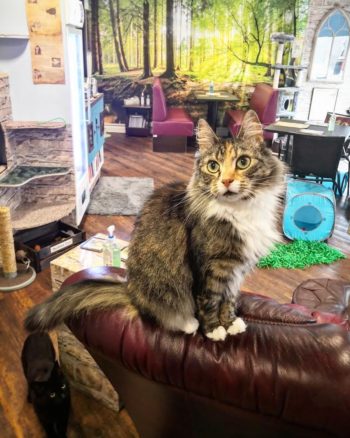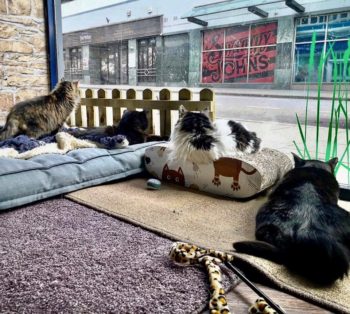Prime Minister Boris Johnson announced the second national lockdown on 5 November, lasting until 2 December, in a devastating blow to hospitality venues in Lincolnshire.

The lockdown, intended to prevent a “medical and moral disaster” for the NHS and try to ensure families could gather for Christmas, pubs, restaurants, gyms and non-essential shops will close.
However, deliveries and takeaways have been permitted to remain open.
Lincoln’s first cat café, Coffee Cats, opened just six months prior to the first lockdown, meaning it had very little time to build up a reserve of emergency money.
“The situation we found ourselves facing was unprecedented – no one knew what to expect,” said Ann Brown, one of the owners of the café.
“The immediate problem was how to carry on with no income. We still had to pay the rent, utilities, plus cat supplies, vet bills, etc.”
Coffee Cats had already had to cut their capacity by 50% and lost hours due to the cleaning time between sessions. They also had to change to a bookings-only system, discontinuing walk-ins.
The result of such measures was a member of staff being let go, as the lack of income deepened.
Chief executive of U.K. Hospitality, Kate Nicholls, said that a second lockdown would cause some businesses to lose all trade and therefore need additional help to survive.
“This will be devastating for hospitality. Not this is for a month ‘initially’ and that afterwards it will be back into existing tiers – long and harmful pain,” she Tweeted in response to the second lockdown being announced.
According to a report from industry analysts CGA, sales from hospitality venues such as pubs, restaurants and bars were down by 33.9% in October, in comparison to the previous year.
They say this comes after the three-tier system put in place in England, and local restrictions and lockdowns in Scotland, Wales and Northern Ireland.
Boris Johnson previously announced that the furlough scheme would be extended to give support for businesses, but Ms Brown says Coffee Cats hasn’t felt this support from the Government, as they “don’t fit into one of their categories”.
They missed out on the higher grant by a single penny.

“They used a very crude system to distribute the grants and didn’t allow any discretion to the council to help us,” said Ms Brown.
With most hospitality venues already deeply struggling, running a café and looking after animals adds complications.
“Having animals in a catering environment needs careful planning.
“They are our priority and need looking after, whatever is happening around you. You can’t put them in bubble wrap, close the blinds and go home,” Ms Brown said.
While she’s confident that Coffee Cats will fare better throughout the second lockdown thanks to further preparation, there are still constant worries.
Despite this, the café has also been aided by some members of the public.
“People sponsored our cats to cover their welfare, made donations of food and cat supplies, raised money, sent messages of support, followed us on Facebook and Instagram – the list is endless,” said Ms Brown, who added she hopes the team managed to thank everyone.
“As everyone was in lockdown, their care was down to us as owners, and we just hoped we wouldn’t get sick ourselves!
“Luckily, the cats have been oblivious to the criss going on outside their world.”

Large chains have also been hit by the restrictions.
High street bakery chain Greggs is set to cut more than 800 jobs, after announcing that, if sales continue to drop at their current rate, “it will not be a profitable business.”
Businesses across the U.K. are worried about the loss of profit they will face over the festive season, which is often their most profitable time.
Chief executive of the British Beer and Pub Association, Emma McClarkin, said that closing pubs across the country is “counterproductive and damaging”.
She said: “The evidence is clear that pubs are COVID-secure, particularly in areas with lower infection rates.
“Without the right support, it would also destine thousands of our pubs and jobs to complete obliteration, as well as major disruption to supply chains and Britain’s brewers.”
Mike Cherry, chair of the Federation of Small Businesses, said that the government’s message on the issue was confusing, and suggested that measures were made with too little notice for businesses to plan ahead.
With the second lockdown once again halting businesses, Boris Johnson told a Downing Street news conference that he was “truly, truly sorry” for the impact on them during this time.
Coffee Cats admits that, like most hospitality venues across the country, the “future is still uncertain”.

